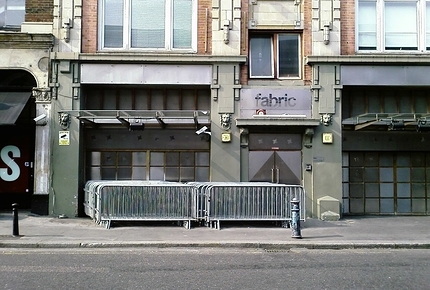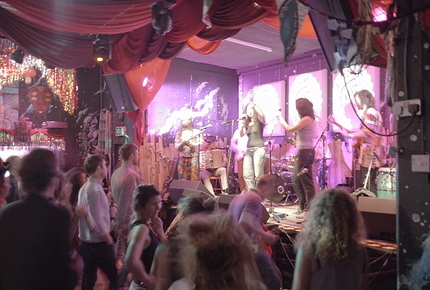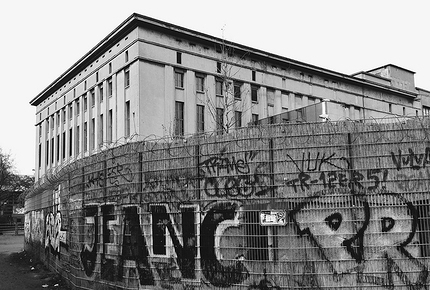Clubbed Out: What London’s Nighttime Economy Can Learn From Berlin
Clubber and scribe David Hillier investigates London's moribund late night scene and asks what the city can learn from the clubbing capital of Europe, Berlin.
“A creative city with a powerful clubbing scene must have three things: affordable space, tolerance, and minimal regulation. These enable self-expression and innovation.” So says Lutz Leichsenring, press officer for Club Commission, a Berlin-based union set up in 2001 to represent the needs of its nighttime economy.
Last year London formed its own industry group, the Night Time Industries Association (NTIA), and it’s desperately needed. The oft-quoted statistic that 50% of UK clubs have closed in the last decade is sadly correct, with totems such as Dance Tunnel, Cable and Passing Clouds all forced to shut. This mass cull reached its apex in September 2016 when Farringdon’s Fabric - the spiritual doyen of UK club culture - had its licence revoked following the drug-related deaths of two teenagers on its premises.
 "The spiritual doyen of UK club culture”: Fabric remains closed after the latest Islington Council ruling
"The spiritual doyen of UK club culture”: Fabric remains closed after the latest Islington Council rulingCreative Commons / Ben Hartley
According to Alan Miller, co-founder of the NTIA, “What people, and the authorities, need to realise is that nightclubs are a part of our ecosystem. They are an intrinsic part of a whole host of things, from fashion and design to advertising and retail. Everywhere, from Hackney to Peckham, from Tottenham to Hounslow, whole areas are being shaped by what’s happening with the nighttime economy.”
Across the country, £66 billion is spent in nighttime venues every year. The industry accounts for 8% of UK employment, with 1.3 million people pulling pints, manning doors or serving tables. And it’s increasingly a reason tourists come to the capital. “People aren’t just flying in for Madame Tussauds or Buckingham Palace any more, they’re coming for XOYO or Oval Space. Clubs are part of London’s repertoire,” remarks Miller.
Feeding this narrative - that clubs are ultimately about so much more than clubbing - is a major part of Miller’s role. He’s hoping this will be made easier when London Mayor Sadiq Khan, who has come out in support of Fabric’s plight, appoints a ‘Night Czar’. The Czar will act as go-between for all the related parties and, most importantly, work in the best interests of late night culture in London.
In many senses Miller takes his lead from Leichsenring, who has championed this approach since joining Club Commission in 2004. Berlin is a long-time incubator of creativity, and Leichsenring also places heavy emphasis not just on the financial value that nightclubs bring to the city - although 35% of visitors to the city come for the nightlife - but on their ability to inspire the next generation of free thinkers and maverick artists. And he sees gentrification, a longtime bugbear of London’s creatives, as the mortal enemy of this.
“Lots of clubs in Berlin are in temporary spaces, and some owners decided that maybe they would like to turn them into a shopping mall, or a hotel, “ Leichsenring says. ”But around 15 years ago people started rethinking: maybe we don’t need another shopping mall. Because if you are young and creative, and have ideas about changing the world and you want to be free, then highly gentrified areas are not places you will go.”
 Dalston's Passing Clouds shortly before its closure in August 2016
Dalston's Passing Clouds shortly before its closure in August 2016Creative Commons / John Lubbock
One person who has keenly felt the dent of the developer’s boot in London is Gudrun Getz, Events Manager at Dalston’s Passing Clouds. In August the venue was closed down after a protracted and draining legal battle with their landlord, and they have been forced to leave a building they have lovingly spent a decade crafting into one of the city’s most forward-thinking arts and entertainment spaces. A building, it should be noted, that they also spent £200,000 redeveloping without being given an option to buy. They are currently appealing the decision.
“There's a lot of fear in the nighttime community at the moment,” says Getz. “Every venue owner I've spoken to is worried that they're going to be next on the chopping block.” According to Getz, there's a lot more that local councils could be doing. “Wandsworth Council, for example, put Article 4 Directions in place that protected over 100 pubs and venues from being closed down. It wasn't an easy or quick process, but they recognised the importance of their nightlife. More councils should be following their lead, and I also think some kind of national legislation should be put in place - something along the lines of a Cultural Heritage Protection Act, which marks out certain areas as being culturally significant and beyond development.”
The difference in Anglo and German attitudes to their clubs were made poignantly clear when, on the very same day that Fabric was ordered to close, Berlin’s industrial techno temple Berghain won a case that ensured it a place in a lower tax bracket. This bracket is reserved for venues providing works of cultural significance, so Berghain now sits alongside concert halls, museums and theatres as a high culture venue. Vive le difference.
The two cities also vary greatly in their attitude towards drugs. Before Fabric was shut, this year had actually been widely perceived as a progressive year for drug policy in the UK. In September, a cross-party report calling for the legalization of medical cannabis was released, while Tory MP Crispin Blunt recently called for the regulation of all drugs. This was on the back of police-approved drugs testing, undertaken by harm reduction charity The Loop, that took place at this summer’s Secret Garden Party and Parklife festivals. Sadly, Fabric has taken the sheen off those big leaps forward.
“If people think closing these places is going to stop people taking drugs then that’s nonsense,” says Miller. “It’s a very parochial, narrow view, because what they’re actually saying is ‘not on my patch’. It’s not thinking about what’s best for society, because what’s best for society is to address the issue and discuss how we can best handle it. But that’s not a question for club owners exclusively, it’s a question for the British people.”
Miller states that a major hurdle is the insistence on holding venues accountable for personal behaviour. “If someone decides to swallow some pills and go to a club, the club gets punished. We want to work in partnership with people - police, local councils, club owners, the Mayor’s office - to not isolate one group or blame one group in the chain.”
 Berlin's infamous Berghain nightclub
Berlin's infamous Berghain nightclubCreative Commons / James Dennes
Over in Berlin, there’s a more far more tolerant attitude despite drugs being technically illegal. “I think Berlin was always very liberal,” says Leichsenring. He cites a federal government-funded program called Best, where club stuff are trained about drugs and how to do deal with someone having a bad reaction. “It’s just good to have everyone informed,” he says.
Leichsenring also says that although a venue would be accountable for a person’s drug taking if they supported it, the police would call in the owner to discuss how they were going to address a drugs-related problem rather than wade in with an ejection notice. This kind of considered, adult dialogue is largely due to the Club Commission getting people round the table and talking things out, and preventing knee-jerk decisions that have far-reaching effects.
The final, and in Miller’s opinion most important, action that needs to be taken is for more 24-hour licenses to be allocated to UK premises. Only four high-profile clubs in London have them - Egg, Fire, Ministry Of Sound, and Fabric (pending a November appeal against its closure). Berlin has been a 24-hour city since 1949. In some ways its not fair to compare two such entrenched cultural standpoints, but its clear that removing the shackles of draconian last orders and lights up times will help the unique creativity of club culture to foster.
“If you have a nightlife where it is just 9pm - 2am, it is the same routine everywhere, everywhere looks the same, and people consume a lot of alcohol in a small amount of time,” says Leichsenring. “But when you have the freedom of 24 hours it gives people so many options; for instance, the best time to go dancing at Berghain is between 3pm and 9pm on a Sunday. If things are too regulated, there won’t be new music, new fashion, new art. You need space for people and you need to give them the time, so magical things can happen.”
If you want to support club culture in London or any UK town, sign up to NTIA’s Nightlife Matters campaign - www.nightlifematters.com.
Do you have any Feedback about this page?
© 2026 Columbus Travel Media Ltd. All rights reserved. No part of this site may be reproduced without our written permission, click here for information on Columbus Content Solutions.









 You know where
You know where